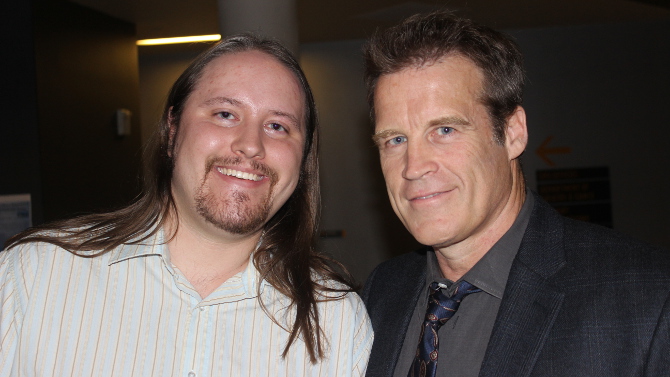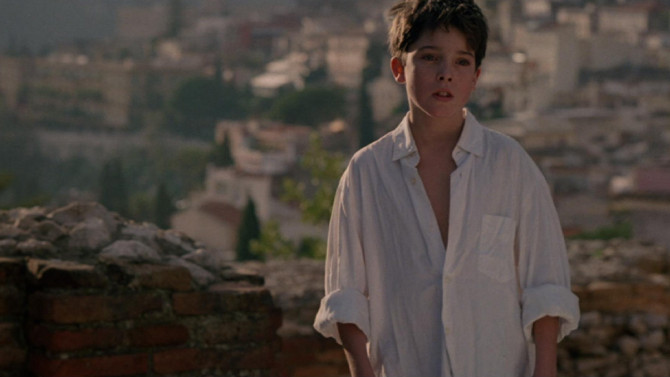I was fortunate enough recently to spend some time with Mark Valley. The actor has become a major player in the world of television, already having left a lasting impact in what has been termed ‘The Golden Age’ of the medium. Playing major roles on Boston Legal (Brad Chase), Human Target (Christopher Chance), Harry’s Law (Oliver Richard), Body of Proof (Tommy Sullivan), Crisis (CIA Director Widener), CSI: Crime Scene Investigation (Daniel Shaw), and so many other shows, he has developed many unique and intriguing characters over his twenty plus years in the business. If I had to choose one performance that exemplifies his craft, it would be his turn as John Scott in the science fiction drama Fringe – though he only appeared in twelve episodes (in a series that lasted five seasons), his character left a lasting impact that was felt long after his arc was over. Valley is currently working on a new series titled Famous in Love, which premieres next month. Valley has also dabbled in film, most notably in features like The Siege, Stolen, Zero Dark Thirty, Live by Night, as well as voicing The Cyclops in Shrek the Third.
A proud Northern New Yorker (born in Ogdensburg), Valley has played an integral part in starting the St. Lawrence International Film Festival, set on both the American (Potsdam and Canton) and Canadian (Ottawa and Brockville) sides of the border. Having a place on the advisory board, the festival is currently expanding online, highlighting short films which deserve kudos each month.
Turning to the actor’s favourite film, Valley quickly referenced the 1992 French Canadian film Léolo. Calling it a twisted coming of age story, he has long been intrigued by the complicated questions that it brings up, as well as the striking visuals from director Jean-Claude Lauzon. On our second meeting, we recorded the interview found below – make sure to check it out to hear all of Valley’s thoughts on the film.
Set in an impoverished Montreal apartment complex, this coming of age fantasy, which is also written by the feature’s director, follows a young boy named Léo Lauzon (Maxime Collin) as he delves into his own psyche to escape his complicated childhood. His family, which is riddled with mental illness, lives in a tiny flat, and the boy is forced to sleep with his older brother Fernand (Yves Montmarquette). Though he has a loving, caring Mother (Ginette Reno), she is utterly overwhelmed by the life they lead. Attempting to escape the harsh realities found within the claustrophobic walls, he fantasizes about an alternative life – writing all of his thoughts down in his trusty journal. Early on, he explains his imaginative theory: “They say I am French Canadian, but because I dream, I am not. They say he is my father, but I know I am not his son because he is crazy. Because I dream, I know I am not”.
The Father (Roland Blouin), with his wide, sloped shoulders and giant gut, is more interested in the family’s daily bowel movements than with anything else. He, like his father before him (Julien Guiomar), is troubled by mental health issues – which has likewise been passed along to Léo’s older siblings. Léo does not acknowledge his name or roots – he goes by the moniker Léolo Lozone, and believes that his father is an Italian by way of a bizarre fruit related incident – that is creatively original.
It is a confusing time for the boy, who is in a hormonal flux, just discovering his sexual urges. He becomes infatuated with the slightly older next door neighbour, Bianca (Giuditta Del Vecchio), fantasizing that she sings for him through his closet door (bright light emits through the widening crack, which is then followed by a picturesque vision of Italy). A strangely bizarre twist is that his grandfather pays her to attend to his fantasies and needs while he takes his baths.
Fernand has his own troubles. Placed in a special education class, which he has managed to flunk out of, he is bullied by a local thug on the street (Lorne Brass) – this convinces the young man to become a body builder.
Fighting to make ends meet, the brothers collect papers for a fishmonger, and Léolo dives off of a pier to collect lost fishing tackle that has become lodged in junk that has been tossed into the water. On Sundays, they visit those family members that have been sent (once again) to the asylum. It is a revolving door of mania. Clashes often occur within the household, from smaller tiffs over bowel movements, to the grandfather’s attempted drowning of Léolo for splashing him too much while playing in a kiddy pool (a perfect example of the fantastical visuals presented by Lauzon). Will Léolo be able to escape the confines of his family, finding comfort in his dreams until he is old enough to escape?
A unique piece of cinema, it is sadly the last motion picture Lauzon ever made (he died in a plane crash in 1997 while he was planning his third feature) – Léolo was placed at number 5 on the Toronto International Film Festival’s “Top 10 Canadian Films of All Time” (the decision is made by Canadian critics and filmmakers). The winner of three Genie’s (kind of like Canada’s Oscars), including Best Original Screenplay, the tale is a complicated philosophical journey. There are not too many easy answers, and if there are, they are usually replaced with two more questions. For instance, we are never really sure exactly how much of the unreliable narrator’s story is actually true. Is the attempted drowning exaggerated to emphasize the predicament he is in? It is just one example of many.
It is also the type of film that evokes so many different emotions – excited wonderment, pained sorrow, disgust, hope and sadness. Though fantastical, it lives in a very real world that is both awkwardly funny and depressingly tragic. It does not sugarcoat the complexities of life, love and those uncomfortable teenage years, rather, it embraces a wide range of emotions and factors. It teaches our introverted, voyeuristic protagonist about so many life lessons (fear . . .), and we, the audience, are richer for it.
The music that weaves its way through the tale is breathtaking. Fusing intense horror elements and chanting that seems to echo up through the ages, with songs from The Rolling Stones (You Can’t Always Get What You Want) and Tom Waits (Cold Cold Ground; Temptation), it adds to the piece’s enchanting intensity.
A fascinating look into the mind of a young burgeoning artist, Léolo is a highly original motion picture. Featuring impressive visuals, a deep philosophical narrative and rich performances, it is the type of film that will stick with you long after the credits finish rolling. Though I have tried to review it here, it is so complex and utterly different that it does not truly do it justice. Narrated in an unorthodox way, the tale comes from the journal Léolo is constantly writing in, though it is often told from a character simply known as The Word Tamer (Pierre Bourgault) – a seemingly impoverished man, he is a proponent of literature and finds the ripped papers in the trash (he is searching for treasures) and reads the boy’s story. It is fitting that Don Quixote is referenced at one point in the film, as there are definite correlations to that classic novel. The richness of the varied, expansive, personal story makes more sense when you realise that Lauzon grew up in a family very much like the one found onscreen – he too was surrounded by psychosis (other than his mother). So, make sure to write this one on your ‘movies to watch’ list and discover the stuff that dreams are made of.


